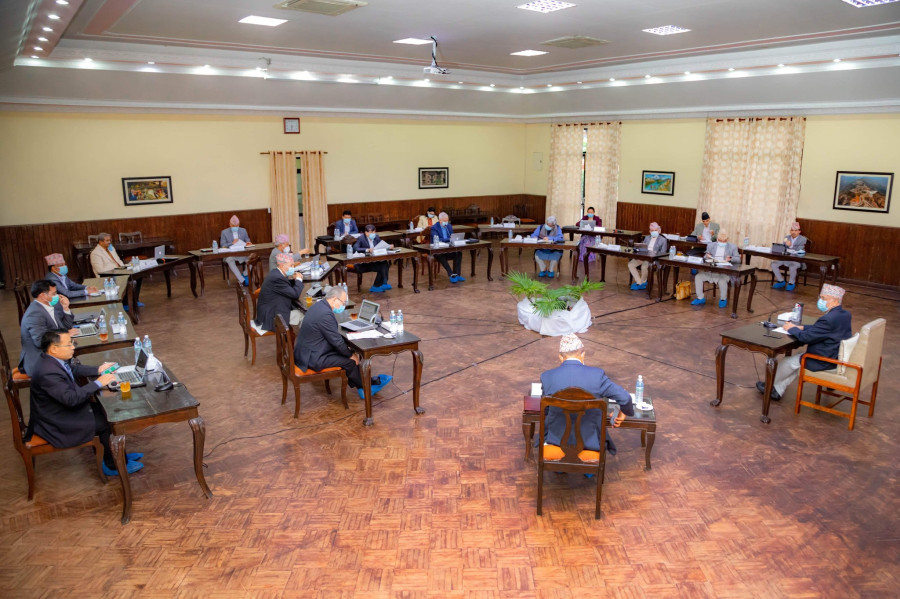National
In yet another turnaround, government to allow one to two repatriation flights a day
Cabinet decision comes days after a decision not to bring back any migrant workers citing lack of quarantine and less than two weeks after limiting the number of returnees to 500 a day.
Tika R Pradhan
Resorting to further vacillation over the repatriation of the migrant workers awaiting to return home, the Cabinet on Thursday decided to allow one or two flights a day into the country.
The Cabinet meeting has decided to direct four ministers including Deputy Prime Minister Ishwor Pokhrel, Home Minister Ram Bahadur Thapa, Health Minister Bhanubhakta Dhakal and Finance Minister Yubaraj Khatiwada to make necessary decisions and arrangements of the international flights.
The government may come up with a concrete decision on Friday, according to a source familiar with the matter.
This is the fourth different decision the government has made over repatriation of workers over a period of two weeks.
First, the government had extended the repatriation flights up to August 30, allowing at least a dozen of flights daily.
Then it imposed a daily quota of bringing 500 migrant workers—300 of them on the recommendations by Nepali missions abroad and 200 under the Foreign Employment Welfare Fund repatriation programme which covers their airfare.
But on Monday, citing a sudden rise in coronavirus cases, the government decided to completely stop the repatriation flights.
The decision, however, faced criticism, and on Thursday, the fourth decision came, saying the government may allow one or two flights a day.
At least two ministers told the Post that the Cabinet decided to limit the daily rescue flight to one to two.
“With no proper arrangements to manage them after they return, the government has decided to limit the rescue flights,” Tourism Minister Yogesh Bhattarai told the Post. “Since the returnees have to stay at hotels in quarantine at their own expenses, we have decided to limit the flights.”
It was Bhattarai who had been given responsibility by the Covid Crisis Management Centre to arrange quarantine facilities for the Nepalis returning home. Accordingly, the government had published the names of around 65 hotels where quarantine facilities were set up.
The government had negotiated the rate that ranged from Rs2,000 to Rs8,000 per night, depending on the standard of the hotels.
According to hoteliers, only a few hotels were used as quarantine facilities and they were partially occupied by health workers.
Rameshwor Raya Yadav, minister for labour, employment and social security, said returnees having PCR reports not older than 72 hours would be sent home but others would be kept in quarantine for seven days and their PCR test would be conducted.
All those coming from abroad will be quarantined if they do not have results of PCR tests, another minister told the Post.
Earlier on Monday, the Covid Crisis Management Centre had announced that since coronavirus cases have increased in recent days and local levels have issued prohibitory orders, there has been no information on available hotels for quarantining the returnees.
“Hence, all flights should be suspended,” the Committee wrote to the Ministry of Tourism and Civil Aviation.
Migrant workers who had already reached the airport in the United Arab Emirates were disappointed and the Nepal Airlines flight that had gone to bring them had returned empty.
A wide body jet of Nepal Airlines can accommodate 274 passengers.
On August 10, the Cabinet decided to allow only 500 migrant workers to return home per day.
The decision had come under fire from labour migration experts and the National Human Rights Commission saying that at that rate, it would take months before the migrants returned home.
Government spokesperson Yubaraj Khatiwada told a recent press briefing that nearly 45,000 migrant workers have registered themselves with Nepali embassies and missions abroad to return home. With two flights a day, it would take months for them to return.
According to an estimate by the National Human Rights Commission, in addition to hundreds of thousands awaiting repatriation, visas of about 1,500 Nepali workers are expiring every day.
Earlier this week the United Arab Emirates announced that foreign workers in the country whose visas had expired before March would have to leave the country by November 17 or else face punishment and fines.
Thursday's Cabinet also decided to set up 10,000 isolation beds in Kathmandu Valley, screen people in areas with the high number of coronavirus cases and direct local authorities to impose prohibitory orders in districts with more than 200 cases.




 16.12°C Kathmandu
16.12°C Kathmandu














